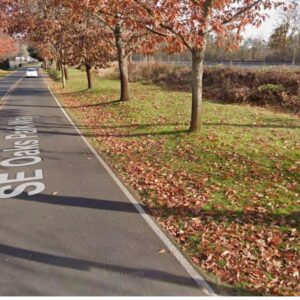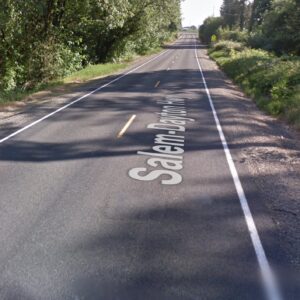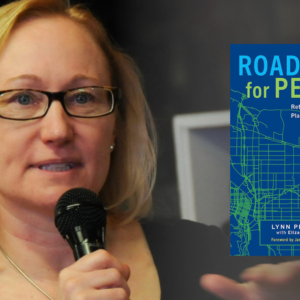Susan Otcenas has a keen eye for erratic drivers. She’s logged thousands of miles on her bike, riding between her business in Hillsboro and to meetings in and around Portland.
Last Sunday night, while driving, she watched in horror as the car in front of her struck a cyclist riding in a bike lane on TV highway in Beaverton…and then kept on going.
Luckily the drunk driver – a repeat offender with four prior DUII convictions driving on a suspended license – was eventually caught after crashing into a car further down the road.
Susan learned a lot from the incident and wants to share some valuable lessons:
- I knew license plate number, make, model and color of vehicle, etc…But the officers responding on the scene asked several times “Can you describe the driver?” Other than the briefest of descriptions (like “male, olive complexion”), I couldn’t. So if you can get a good look at the driver, be sure to do so.
(This necessity to identify the driver in order to prosecute them is unacceptable to BTA Director Evan Manvel.)
- If you see someone driving erratically, call 911. If you ever see someone driving suspiciously, don’t hesitate – you should call it in. You could be saving someone else’s life.
-
Carry a cell phone. The cyclist was coherent enough to dial his wife. I spoke with her and reassured her that he was conscious, that the ambulance had arrived, and kept her updated on where the ambulance was taking him. I was wishing for a camera-phone, so I could take a photo of his position, where the bike landed, etc. You just never know when that info might be
useful to prosecutors.
(Photos might also be useful if you plan on prosecuting the case yourself.)
- There are some things we can not “protect” ourselves from. While I consider myself to be a relatively skilled and observant cyclist, I never assume that I’m safe out there.
Last night KATU-TV did a full report on this story and interviewed Susan. You can read and watch it on the KATU website.
Unlike KGW’s poor Zoobomb coverage last week, KATU’s story was more thoughtful and fair, referring to the drunk driver’s car’s “3,000 pound” weight and calling it a “lethal weapon.” and reminding viewers that the motorist in a similar crash two weeks ago still hasn’t been charged with anything. **Editor’s Note: After a commenter brought this statement to my attention, I realized it was a careless thing to say. Not only are these two crashes totally different, but I did not intend to make people think that the McDaniel investigation was going too slowly.







Thanks for reading.
BikePortland has served this community with independent community journalism since 2005. We rely on subscriptions from readers like you to survive. Your financial support is vital in keeping this valuable resource alive and well.
Please subscribe today to strengthen and expand our work.
I know that I, along with all other cyclists, hate it when people honk, but in this situation……honk like there is no tomorrow in order to warn the cyclist??
Is this need to identify the driver codified in the Oregon Revised Statues or is this just something that local law enforcement do because that’s how they operate?
I’m not sure what honking would have done. Is there any indication that she saw that anything was GOING to happen?
I think the biggest point (made via the link to BTA director Evan Manvel’s article) is that the owner of a vehicle has no legal culpability in the accident. If the driver cannot be identified, then there is no case. As anyone who has ridden in the winter knows, seeing through wet windows, at night, with all that refraction going on, it is almost impossible to i.d. the driver.
Remember that drunk-driver who struck and killed 2 cyclists on Belmont a few years ago? Well the owner of the vehicle was able to go and pick up his van the next day, despite the fact that he had allowed a driver, whom he knew had no license, to drive the vehicle.
It’s time we change the law to hold vehicle owners responsible for the damage done with their vehicles.
With this kind of carnage, we still have the Portland Police Bureau deploying resources to ticket bicyclists who coast thru a stop sign?
Its time that ALL PPB traffic personnel are assigned to reduce incidents that truely threaten life and property, not those that merely create public relations problems for the City.
I am waiting for something like this on Greeley Avenue in N. Portland, where a proposal for a separated bike trail between N. Interstate and N. Going was nixed in favor of current (lower priced) bike lanes.
Portland strives to be a Copper bike town, not Platinum.
*Some* departments are even worse: They want you to be able to personally identify the driver, and sign a complaint. Meaning, you have to make a citizen’s arrest. They don’t want to be involved *at all*.
So I don’t think any of these things are requirements, but departmental policy. In this case, it’s kind of a “we don’t want to do anything if we don’t absolutely have to” kind of policy, I think.
Hello Jonathan; thank you for the post. I enjoyed the link to the Channel 2 story. Two comments:
Accidents like this bring out a lot of rage, as well they should. I lost a dear friend to a drunk driver. These situations can, however, get complex. While laws might be written to provide some liability for car owners it is basic to our legal system that people commit crimes, not cars. Police shouldn’t fail to investigate without witness identification, just as many other crimes are prosecuted without anyone whitnessing the crime. A good identification will help though. Many families have four or five drivers using a single vehicle. It would not be right to hold all of these people accountable for the crimes of one.
The second point is the post ends by comparing this to a ‘similar crash’ two weeks ago. This is inflamatory journalism and not fair to the driver in that case. The crashes have little in common. The implication is that two weeks have gone by and still justice hasn’t been done. The Forest Grove crash was a horrible affair. It could have been anyone out there in the bike lane. The sad truth is that this may also have been a simple tragic accident that any one of us behind the wheel of an automobile could have committed. Two weeks is not too long to allow investigators to determine what laws were broken and what the intent and state of mind of the driver was at the time of the accident.
2ndAveFlyer,
Thanks for your comment and for calling me out on my “inflammatory” statements. While I like to think of them more as careless rather than inflammatory, I agree with you to some extent and I have edited the post accordingly.
2ndAveFlyer,
I don’t think that anyone is suggesting that 5 drivers of one vehicle be held responsible. I think most people think that there should be a “buck stops here” element to the law. If no one owns up to driving the car, then the owner pays the piper. Certainly we charge people and not cars, but as the owner of the car, shouldn’t someone know what the heck is being done with their vehicle? Shouldn’t there be a law that insists that they take responsibility? Won’t that influence how easily cars are “lent out?”
Think of it this way. If I lent someone a gun, don’t you think I have some level of culpability?
I honestly don’t think there is any difference between a gun and car when it comes to level of responsibilty. Someone needs to be the final “authority.” Perhaps the law would reduce the loaning out of cars in cases where the owner isn’t really that close to the driver. Maybe keys would cease to be community property. Is that a bad thing?
Really, the current law just makes it way too easy for people to skip out on their responsibilities. There has to be a better way.
I believe that civil law provides recourse against a vehicle’s owner just as your hypothetical gun owner could be sued for negligently loaning that weapon.
Criminal law has a higher burden of proof and that’s largely why the police and prosecutor really need that positive ID. Otherwise, a halfway competent defense attorney can easily create enough reasonable doubt to avoid a conviction. If the owner of the borrowed vehicle has an alibi and he will not rat out his spouse / kid / buddy (Uhh, I dunno who took my spare keys.), a jury cannot convict without eyewitnesses. I agree there should be more responsibility but we also can’t just lock people up for owning a suspect vehicle when they can prove they were not behind the wheel.
Another great tip as a witness:
I was hit last summer and all of the witnesses wrote there name and number on a business card and stuck it in my wallet. When I came home from the hospital I was not only able to call and thank them but I had 4 more witness names/numbers then the police report had room for.
One thing that would very helpful for ID’ing the driver is to pass a state law prohibiting tinted or mirrored windows on vehicles.
I mostly agree with tonyt, though I think that the owner should be let off the hook if they weren’t driving the vehicle. In theory the owner should be able to ID the driver at the time. I’m sure this opens other cans of worms, but I agree with above statements that there needs to be more responsibility.
-Matt P.
Jonathan; I enjoy your open-minded and fair approach to journalism. I assumed your wording was careless and not an attempt to get cyclists agitated. Keep up the fabulous job.
“Unlike KGW’s poor Zoobomb coverage last week, KATU’s story was more thoughtful and fair, referring to the drunk driver’s car’s “3,000 pound” weight and calling it a “lethal weapon” ”
Brian Barker from KATU is an avid cyclist. He came to my office to interview me and we had a long chat about bicycling in general, relations between drivers and motorists, efforts to keep drunk drivers off the road, etc. As a reporter he has to strive to remain “balanced”, but as a cyclist he certainly understands the hazards that cyclists face on our roadways.
I was pleased that he wanted to pursue and publicize this incident. I was glad there was no implication in the broadcast that the cyclist did anything wrong or was in any way somewhere he should not have been. However, I would have liked to have seen some discussion/reporting on the problems we have in Oregon keeping DUII drivers off the road (seems like they have to kill or maim before they’re kept in jail), rather than just a recounting of the incident itself. It’s too bad that they did not use this incident as an opportunity to open a dialogue with viewers about drunk driving. Over and over, we hear these stories about repeat offenders set free to drive again. But the system will not change until there is sufficient public outrage to move government to action.
Here is the ballot initiative language that will reduce drunk driving:
Ballot measure number 1:
Shall the penalties for a DUII conviction in Oregon be changed to the following:
1)First offense – forfeiture of car to the state, $10,000 fine and 6 months in jail.
2)Second offense – forfeiture of car to the state, $50,000 fine and 5 years in jail.
3)Third offense – life imprisonment.
Ballot measure number 2:
Due to the anticipated increase in the number of prisioners due to Ballot measure number 1, shall the state of Oregon house all prisoners convicted for DUII offenses in new, low cost tent prisons (inside wire and concrete walls) similar to those in Maricopa County, Arizona, complete with fields for the prisoners to grow their own food as much as possible?
I would be careful in the wording of the proposed ballot initiative. How many times have we seen the initiatives passed by the public, only to see them thrown out by a judge because they fail to pass the Oregon test of only one issue per initiative.
I had to laugh after Tim’s post because it is so true to Oregon’s politics at the moment. A noble idea crushed because (A) the wording was not legally perfect, (B) the tent prisons would be nicer than Dignity Village and that would ignite a firestorm of hand wringing and cries of inequality in Multnomah County and (C) someone would file a legal challenge that, despite the deaths of innocent cyclists, pedestrians, and drivers, drunk driving is a disease (alcoholism) not a crime and thus forfeiture of property and imprisonment is “cruel and unusual” punishment.
But a year-round tent prison outside of Burns – now that’s a deterrant!
Susan:
Thanks for the very thoughtful post and for your efforts to raise public awareness about DUII. As we look at our traffic crashes in Portland, DUII is definitely an extremely high priority.
On that note, the Community and School Traffic Safety Partnership is currently working with a DUII Working Group and PSU to develop a DUII Action Plan and Implementation Strategy.
The Working Group includes treatment providers, the courts, police, transportation, Multnomah County, university researchers, the BTA, OLCC, and others.
There are lots of great resources about DUII as well as some of the work that has been done on the Implementation Strategy online at:
http://www.its.pdx.edu/cstsp/duii.php
That page will be continuously updated as the strategy comes together. The good news in it is that we already have a strong public-private, inter-agency team of front lines service providers working together to understand our challenges and opportunities to reduce this terrible problem.
Thanks again for your energy on this issue. If you have more questions about the effort, please feel free to give me a call.
Thanks.
Greg Raisman
Community and School Traffic Safety Partnership
Portland Office of Transportation
(503) 823-1052
someone sez: “One thing that would very helpful for ID’ing the driver is to pass a state law prohibiting tinted or mirrored windows on vehicles.”
This law already exists. There is a limit as to how much tint can be applied for the drivers door and windshield. People who apply tint for a living face HEFTY fines if caught (ie: vehicle involved in accident). This apparently is the limit of enforcement.
Backyard tint applicants are the ones causing the problems. Perhaps someone with the Portland Police can comment on what we can do. Take plate numbers?
Tim in post #15 above makes an excellent point about my post #14 above: be careful with the wording.
For example, my original wording: “Shall the penalties for a DUII conviction in Oregon be changed to the following:” should be changed to read: “Shall the penalties for a DUII conviction for motor vehicle drivers in Oregon be changed to the following:”
This will prevent the Portland doughnut eaters (cops) from sitting outside local cyclist bars and doing DUII “stings” on bicyclists! Don’t laugh. They are stupid enough to do stop sign and stop light “stings” as we all know!
It is official now – they are looking for a new police chief. Our cyclist advocates need to be talking to the mayor or other people in power to get some policy changes regarding cops and cyclists and stop signs and lights.
Our cycling advocate lawyers need to be filing a lawsuit against the cops for the stop light stings that have resulted in the cops being negligent to respond to 911 calls because they were wasting taxpayer funds harassing cyclists. Some incidents have been documented on this website. This needs to be brought to the attention of the city officials who might make some changes.
(Re post 2 – Donna) The requirement to identify the person is so that they ultimately can be charged. Where I live, our Road Traffic legislation provides that once a person’s name is identified on the complaint (or whatever you call the document that actually charges the person), it is proof of identity in the absence of proof to the contrary. Such a measure is vital for the sorts of traffic infringements where the only evidence of identification you have is the licence plate taken from the back of a car driving away.